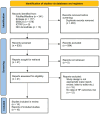High and Low Adherence to Mediterranean and DASH Diet Patterns and the Risk of Heart Failure: A Meta-Analysis of Observational Studies
- PMID: 39860003
- PMCID: PMC11766615
- DOI: 10.3390/life15010063
High and Low Adherence to Mediterranean and DASH Diet Patterns and the Risk of Heart Failure: A Meta-Analysis of Observational Studies
Abstract
Background: The relationship between heart failure (HF) and Mediterranean and DASH diets is not well delineated. This meta-analysis aimed to assess the effectiveness of high adherence to Mediterranean and DASH diets compared to low adherence in reducing the risk of incident HF (primary prevention of HF) and reducing all-cause mortality in patients with HF (secondary prevention of HF).
Methods: The reporting stages of this meta-analysis closely adhered to the PRISMA guidelines. A comprehensive literature search was undertaken for published papers in PubMed, Embase, EBSCO, ICTRP, and the NIH clinical trials databases.
Results: A total of 16 reports from 14 studies were included in this paper. A significant inverse association was identified between high adherence to the Mediterranean diet model (compared to low adherence) and the risk of incident HF (OR = 0.77, 95% CI: 0.63-0.93, p = 0.007) among patients without previous diagnosis of HF. Similarly, there was a significant and inverse relationship between high adherence to the DASH diet (compared to low adherence) and the risk of incident HF (OR = 0.83, 95% CI: 0.70-0.98, p = 0.03) among patients without previous diagnosis of HF. High adherence to the Mediterranean diet model (compared to low adherence) was associated with lower all-cause mortality (OR = 0.88, 95% CI: 0.78-0.99, p = 0.03) among patients with HF.
Conclusions: This paper demonstrated that high adherence to Mediterranean and DASH diets significantly reduced the risk of incident HF among individuals without a previous diagnosis of HF, whereas only high adherence to the Mediterranean diet was associated with lower all-cause mortality among patients with HF.
Keywords: DASH diet; Mediterranean diet; heart failure; meta-analysis.
Conflict of interest statement
M.E.A. and M.E.K. declare that they have no conflicts of interest to be disclosed. M.B.Y. has received institutional research fees from Bayer Healthcare Pharmaceuticals, Amgen, Novartis, Dalcor Pharmaceuticals, Novo Nordisk, Astra Zeneca, and Boehringer Ingelheim.
Figures



Similar articles
-
Effects of Mediterranean Diet, DASH Diet, and Plant-Based Diet on Outcomes among End Stage Kidney Disease Patients: A Systematic Review and Meta-Analysis.Clin Pract. 2022 Dec 28;13(1):41-51. doi: 10.3390/clinpract13010004. Clin Pract. 2022. PMID: 36648844 Free PMC article.
-
Mediterranean and DASH diet scores and mortality in women with heart failure: The Women's Health Initiative.Circ Heart Fail. 2013 Nov;6(6):1116-23. doi: 10.1161/CIRCHEARTFAILURE.113.000495. Epub 2013 Oct 9. Circ Heart Fail. 2013. PMID: 24107587 Free PMC article. Clinical Trial.
-
Investigation of adherence to DASH diet components and reduction of heart failure risk in adults: A case-control study.ARYA Atheroscler. 2024;20(4):38-46. doi: 10.48305/arya.2024.42670.2964. ARYA Atheroscler. 2024. PMID: 39717422 Free PMC article.
-
Mediterranean-style diet for the primary and secondary prevention of cardiovascular disease.Cochrane Database Syst Rev. 2019 Mar 13;3(3):CD009825. doi: 10.1002/14651858.CD009825.pub3. Cochrane Database Syst Rev. 2019. PMID: 30864165 Free PMC article.
-
Adherence to the dietary approaches to stop hypertension diet reduces the risk of diabetes mellitus: a systematic review and dose-response meta-analysis.Endocrine. 2024 Oct;86(1):85-100. doi: 10.1007/s12020-024-03882-5. Epub 2024 May 30. Endocrine. 2024. PMID: 38816664 Free PMC article.
References
-
- Celik A., Ural D., Sahin A., Colluoglu I.T., Kanik E.A., Ata N., Arugaslan E., Demir E., Ayvali M.O., Ulgu M.M., et al. Trends in Heart Failure between 2016 and 2022 in Türkiye (TRends-HF): A Nationwide Retrospective Cohort Study of 85 Million Individuals across Entire Population of All Ages. Lancet Reg. Health Eur. 2023;33:100723. doi: 10.1016/j.lanepe.2023.100723. - DOI - PMC - PubMed
-
- Heidenreich P.A., Albert N.M., Allen L.A., Bluemke D.A., Butler J., Fonarow G.C., Ikonomidis J.S., Khavjou O., Konstam M.A., Maddox T.M., et al. Forecasting the Impact of Heart Failure in the United States: A Policy Statement from the American Heart Association. Circ. Heart Fail. 2013;6:606–619. doi: 10.1161/HHF.0b013e318291329a. - DOI - PMC - PubMed
-
- Huffman M.D., Berry J.D., Ning H., Dyer A.R., Garside D.B., Cai X., Daviglus M.L., Lloyd-Jones D.M. Lifetime Risk for Heart Failure among White and Black Americans: Cardiovascular Lifetime Risk Pooling Project. J. Am. Coll. Cardiol. 2013;61:1510–1517. doi: 10.1016/j.jacc.2013.01.022. - DOI - PMC - PubMed
LinkOut - more resources
Full Text Sources
Research Materials
Miscellaneous

